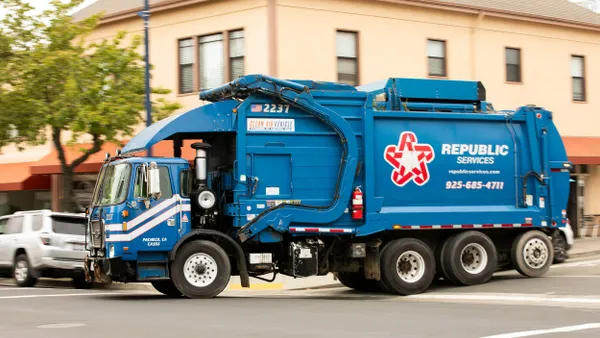Dive Brief:
- The Los Angeles City Council has just voted unanimously to approve contracts with seven companies for 11 commercial waste collection zones. The 10-year contracts will be awarded to Athens Services, Republic Services, Waste Management, Universal Waste Systems, NASA Services, CalMet Services and Ware Disposal.
- The lack of opportunities for women and minority-owned businesses were cited as the final sticking point in negotiations. Councilmember Nury Martinez, chair of the energy and environment committee, was credited by multiple members as helping resolve these issues. Remaining details will be worked out in the coming weeks.
- The Los Angeles Bureau of Sanitation (LASAN) plans to begin transitioning customers into the franchise system starting in July 2017 with the plan of full implementation by January 2018.
Dive Insight:
The details of this plan, which has been in the works for more than six years, were finalized in 2014 and LASAN spent more than a year reviewing bids. Since the Los Angeles Board of Public Works approved the contracts in September, the system's fate has been all but certain.
The franchise system is seen as a key part of the city achieving a 90% diversion rate by 2025 and has been championed by advocates through the Don't Waste LA coalition. Numerous city officials also cited the plan's potential to reduce emissions and help environmental justice communities. Councilmember Mike Bonin called it a way to address the "trifecta of doom" — pollution, noise and traffic — that exists throughout the city.
Other members said this marked a new era in the city's waste industry.
"The years of secrets and the old boys network and members only is over when it comes to this industry," said Martinez, who represents a district known for environmental justice issues. "We need to make communities whole and we need to respect them."
The seven companies have agreed to invest a collective $200 million in collection and processing infrastructure. Clean fuel requirements will also be mandated for the more than 380 collection vehicles that LASAN expects will be needed to service roughly 65,000 accounts. The contract requirements on food recovery, education, diversion rates and other areas are some of the most stringent of their kind with potential financial penalties. This follows a municipal control model that has been advocated by some policy groups.
As Los Angeles begins to implement this system, many in the industry will be watching to see how it affects costs for customers and the efficiency of operations for haulers. The success of this system will be of particular interest in New York, where the Department of Sanitation recently released a request for proposals for a consultant to help the city move toward its own commercial waste franchise zone system. Councilmembers said they've been having discussions with their New York counterparts.
"We know if we’ve influenced New York City we’re already doing a lot," said Councilmember Paul Koretz, one of the plan's original supporters. “We’re a model for the rest of the country, hopefully for the rest of the world."











